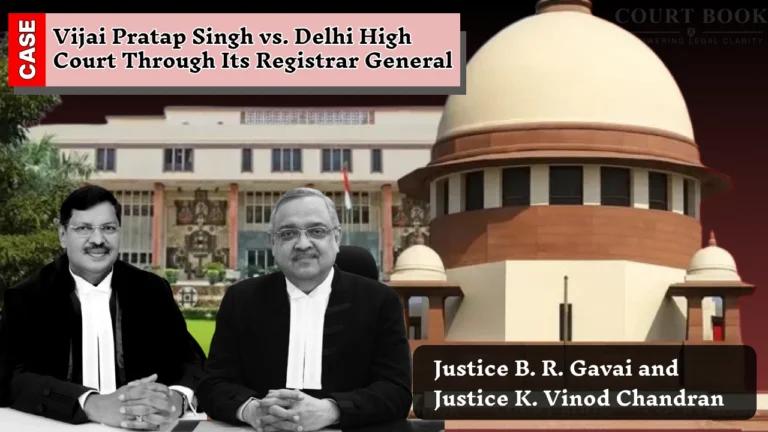In a significant judgment, the Supreme Court of India has upheld the validity of Rule 9B of the High Court of Delhi (Designation of Senior Advocate) Rules, 2024, which restricts applications for senior advocate designation only to retired judicial officers of the Delhi Higher Judicial Service (DHJS).
This verdict came on August 1, 2025, when a Supreme Court bench comprising Chief Justice of India BR Gavai and Justice K. Vinod Chandran dismissed a Special Leave Petition (SLP) filed by Vijai Pratap Singh, a retired judge from Uttar Pradesh.
Read also:- SC Rejects Juvenility in Murder Case, Orders Trial as Adult After Age Proof Fails
Appearing in person before the Supreme Court, the petitioner argued that Rule 9B violated Article 14 of the Constitution, which guarantees equality before the law. He submitted that the rule creates an unjustified classification among retired judges — favoring those from Delhi while excluding other equally qualified judges from different states.
“Why don’t you apply to the Supreme Court? In Supreme Court, everybody can apply,” remarked CJI Gavai to the petitioner.
The bench, however, refused to entertain the matter further and summarily dismissed the petition.
Read also:- Zahoor Ahmad Mir’s Bail Rejected in UAPA Case by J&K High Court Over Terror Links
The Delhi High Court had earlier examined and upheld Rule 9B, stating that the process of designating a Senior Advocate involves not only reviewing an individual’s professional record but also assessing their demeanor, conduct, and stature. These personal qualities, the Court emphasized, can be best evaluated by judges who have worked directly with the applicant.
“Designation as a Senior Advocate by a High Court is not merely on the basis of records available but also on the basis of an individual’s personality,” the Delhi High Court stated.
Read also:- Punjab & Haryana HC Modifies Compensation Deadline Due to Unintentional Delay
The Court further clarified that the designation confers a professional status comparable in dignity to that of a sitting judge. Hence, such evaluations must be carried out with seriousness and sensitivity.
Addressing the constitutional question, the High Court ruled that Rule 9B is based on intelligible differentia — a legal principle that allows classification if it is logical and serves a rational objective.
“The distinction between retired judicial officers of DHJS and those of other states is based entirely on intelligible differentia and is not violative of Article 14 of the Constitution,” the Court held.
The classification, therefore, was found reasonable, valid, and in line with the principles of equality under the Indian Constitution.
Read also:- Kerala High Court Rules Rent Control Petition Maintainable Despite SEZ Act
Key Takeaways from the Verdict
- Institutional knowledge is vital for evaluating candidates for Senior Advocate designation.
- High Courts are empowered to frame rules that maintain the quality and credibility of the selection process.
- The Supreme Court declined to interfere, reinforcing the principle of judicial self-governance.
- Qualified retired judges from other states are not without remedy — they can seek designation before the Supreme Court, which has broader eligibility.
Case Title: Vijai Pratap Singh vs. Delhi High Court Through Its Registrar General
Case Number: SLP(C) No. 15148/2025














